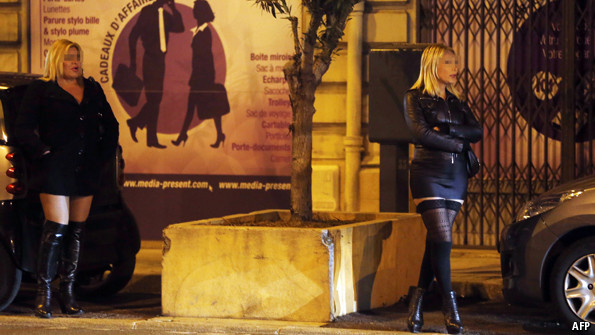At the end of November the French parliament voted on a new law that criminalises buying sexual services. The vote is the result of a big effort that began over 10 years ago after France initiated a ground-breaking investigation about prostitution.
The report, completed 2011, highlighted the buyers’ contribution to the oppression inherent in prostitution. In 2012 the French National Assembly confirmed France’s intention to abolish prostitution. In preparation for the debate in the National Assembly information about prostitution in today’s France has been collected.
Many trapped in prostitution
According to the interior ministry there are at least 20,000 prostitutes in France. Organisations working with prostitution regard 40,000 as a more realistic estimate of the number of people selling sexual services on a regular basis, of which 80 – 90 percent are women. Street prostitution accounts for about half and the remainder consists of “discreet prostitution”; activities organised via the internet (police reports indicate that 10,000 adverts are uploaded daily), at nightclubs and massage salons. It is even more difficult to estimate the number of people who prostitute themselves temporarily (for example students financing their studies). Finally, authorities estimate that between 4,000 and 10,000 persons selling sex are under age.
It is estimated that almost 90 percent of female prostitutes are of foreign origin (Eastern Europe, Nigeria, Cameroon, China and South America) and the great majority of these are prisoners of organised crime groups. 20 years ago the number of foreign prostitutes was less than 20 percent with “independent women” in the majority which demonstrates an “historic turnaround” in conditions.
Research on the buyer side indicates that between 10 and 15 percent of men and a few percent (2 – 3 percent) of women have paid for sexual services in their lifetime. These numbers appears to be on the increase driven by internet prostitution that provides more anonymity.
A law that includes more than fines
The new legislation applies a fine up to €1,500 on the first conviction and €3,000 on subsequent convictions. The penalty also requires the customer to participate in a course designed to create awareness of the causes and consequences of prostitution. Furthermore the state will establish a fund of up to €20M per annum to disburse to approved voluntary organisations working to assist former prostitutes to establish a new life. Foreign nationals wanting to leave prostitution will also be given temporary 6-month residential visas (previously residential visas were only offered to those who provided information about procurers in the criminal organisations).
The law is approved
The legislation was approved with a vote of 260 against 138. Unfortunately as many as 171 individuals did not participate in the voting or abstained from voting. Unlike many other legislative initiatives parliamentarians were allowed a conscience vote without following a party line. A majority of the socialists voted for the law (238 voted yes – 5 voted no) whereas the majority of the greens voted against (12 of 17). On the political right a majority voted against the law (101 no – 10 yes; 87 abstained), primarily because it will be easier for foreign nationals to gain residency if they present as prostitutes. Many voluntary organisations have also taken a stand; in favour of the legislation (among others “le Mouvement du Nid”, which helps prostitutes move out of prostitution), and some against (such as “Planning Familial”. A feminist organisation opposed to sexual discrimination and violence).
Support and debate among the population
In November a survey indicated that the new law has strong support among the general population: 73 percent of those surveyed believe that the fight against prostitution requires potential customers to take responsibility. Support for the legislation is even stronger among young people. Despite attempts by some well-known names to lower the level of the debate by launching their campaign “343 Bastards demand: Hands off my whore!” the exchange of views preceding the vote were most often dignified. There was a broad consensus that the country needs to leave the “grey zone” of the current legislation: human trafficking is obviously illegal; actual prostitution is not illegal but on the other hand actively encouraging the purchase of sexual services is illegal.
Many opponents of the legislation argued that the law can lead to prostitutes becoming even more exposed to violence and exploitation as it may force them into hiding. Some state that the authorities already have legal powers to fight the criminal organisations involved and should not hinder those who choose prostitutions of their free will. On the other hand supporters of the legislation argue that criminalising the customers was the best way to reduce demand and fight the criminal organisations as well as provide many men and women with an opportunity to change their lives. Many emphasised the importance of educating society about the conditions of prostitutes’ lives; the place to start is to focus on the customers. The legislation will now be reviewed by the Senate (second chamber). The feeling is that everything will be completed summer 2014 and the new law will come into force 1 January 2015. For those who want further reading (the book in French is “Renaître de ses hontes” (Le Passeur Editeur).
Malin Roux and Didier Schreiber
Bilden hämtad från



